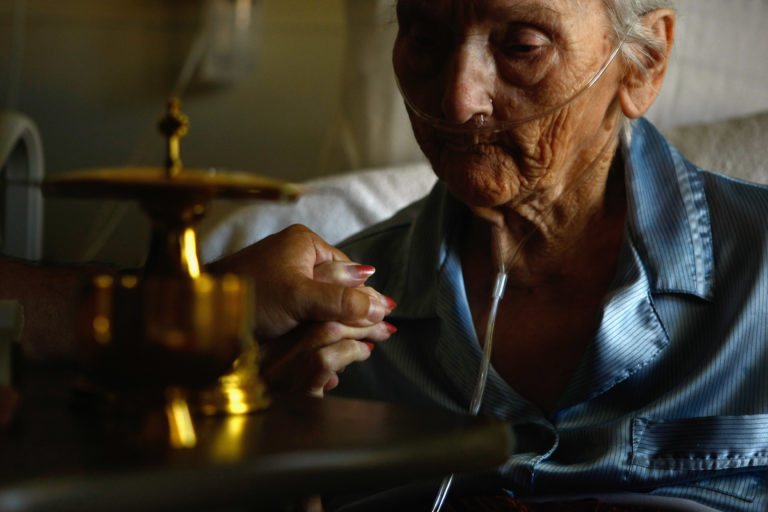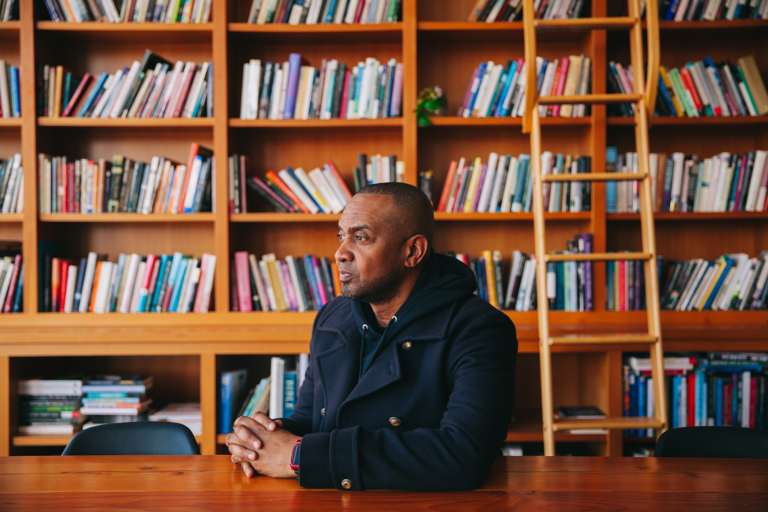
Image by John Moore/Getty Images.
I Am a Midwife to the Holy
When I was a child I never dreamt of being a hospital chaplain. I generally detest hospitals and I don’t trust medical professionals. Hospitals can be giant cesspools for infection and disease; they smell funny. So when I found myself in my last year of seminary training as a hospital chaplain in a Clinical Pastoral Education (CPE) program, I laughed out loud in discovering hospital chaplaincy is a true vocational calling for me.
In CPE, I discovered that I am a trauma junkie.
The world made sense to me the first time I was paged to the ER for a dying patient. Most people who work in trauma (ER/trauma doctors and nurses, EMS, police, firefighters, etc.) are drawn to trauma because they come from trauma.
My own family of origin is a unique cesspool of trauma. I viscerally understand what it’s like to experience physical, sexual, emotional, and spiritual trauma. I have spent my entire adult life trying to survive and overcome my childhood trauma. In chaplaincy, I have been given an opportunity to utilize the coping skills I developed in response to trauma and get paid a salary. The deep shame I have carried from my trauma has transformed itself into hope.

It is oddly comforting and familiar to be with others during their trauma experiences. When I am standing in a trauma bay with a screaming patient lying on the table surrounded by doctors and nurses shouting orders with family members in the waiting room wailing for God, I am at peace.
A few weeks ago, within a three-hour stretch, five different traumas came into the ER, including two drivers who had hit each other, a pediatric trauma that involved physical and sexual abuse of a young boy by his older cousin, a logging incident resulting in spinal paralysis, a traumatic brain injury in a young man due to a self-inflicted gunshot wound, and a older female patient in cardiac arrest.
By the time I left the ER that afternoon, I still had 15 hours left of my 24-hour shift. On days like that I try to pace myself. I pray into those days, asking God to guide my ministry when I am too spent to think clearly. When the pager goes off yet again after my fifth attempt to lie down in my on-call room to sleep I pray that God will show me how to be present to the patient and family I am about to encounter in the middle of the night. I also pray that God will wake me up enough to be able to find the back door to the ER at 3 a.m. Sometimes I leave the hospital feeling faith-filled and well-used. Other days I just go straight to bed and don’t get out of bed until I have to go to work again.

As a chaplain I hold hands, pray, find warm blankets, and bring hot coffee to those who need it. I cry. I laugh. I remain silent when there are no words that could bring comfort. I am the person that staff, patients, and families turn to for comfort. I lay my hands on those who are suffering, and weep with them. Sometimes I pray verbally, but often silently. I wipe away tears and I hug equally into grief and joy. I place my hands on the heads of doctors, nurses, EMS workers, MedFlight pilots, and police officers and bless them. I ask God to protect them and keep them safe. I ask that their hearts remain open to those they serve.
I wait for the coroner to arrive and hold a dead baby when its mother cannot. I go on rounds with doctors and help interpret medical jargon. I gather staff together to debrief particularly challenging traumas — especially pediatric physical and sexual abuse cases. The staff want to protect these children and help them heal. They take it personally if these children die on their watch. I take it personally.
As a Quaker, I was taught to find that essence of God in all people, and I strive to be open to all spiritual possibilities.
My goal is never to convert patients to Christianity, to save them, or to baptize them. Personally, I don’t believe that Jesus died on the cross for my sins. I am not baptized and don’t believe I need to be saved in order to be closer to God. I am a follower of Jesus’ teachings, but I would not call myself a Christian. My theory is that the Apostle Paul suffered from obsessive-compulsive disorder and was more focused on streamlining and managing Christian churches than on following God’s will.
The Bible is a helpful reference guide for me, but certainly not the word of God. Prayer can be verbal, but it can also be nonverbal for me. I believe that God created us, but that God also gives humans choice to live into God’s will for us. I don’t believe that God causes suffering; I do believe that God suffers alongside us. I don’t know if heaven or hell exists, but I’m open to that possibility.

My job as chaplain is not to judge someone else’s theology, but rather to help them to understand it more fully. Many trauma patients would not self-identify as spiritual, however, theology tends to appear when someone experiences a life-altering trauma or illness. Patients want to understand why they are suffering, and they want to look back on the trajectory of their lives and question their choices. I get to be a part of those discerning conversations.
I am a child of God. I am a trauma survivor, a compassionate listener, an empathic healer, an intuitive truth teller. I am a death doula, a minister to souls, a witness, and a guide: a midwife for the Holy. I walk alongside those who are suffering and afraid. I help others to discern God’s will in their own lives. I serve as a reminder of God’s presence in each moment. I am the Quaker shaman.
An extended version of this article was published by Friends Journal.

